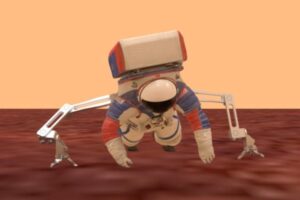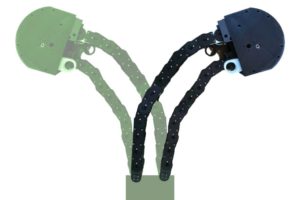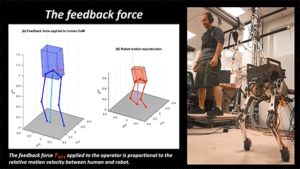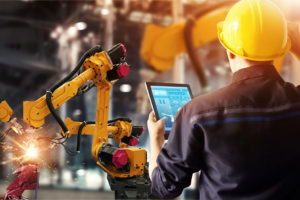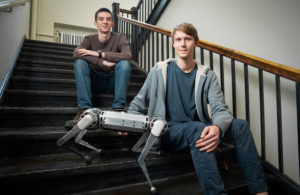The design could prove useful in the coming years, with the launch of NASA’s Artemis mission, which plans to send astronauts back to the moon for the first time in over 50 years.
MIT designs robotic heart chamber
The realistic model could aid the development of better heart implants and shed light on understudied heart disorders.
Inflatable robotic hand gives amputees real-time tactile control
A computer model relates a finger’s desired position to the corresponding pressure a pump would have to apply to achieve that position. Using this model, the team developed a controller that directs the pneumatic system to inflate the fingers.
Training drones to avoid obstacles at high speeds
MIT developed a high-speed flight-planning algorithm that combines simulations and experiments, in a way that minimizes the number of experiments required to identify fast and safe flight paths.
The future of human-robot collaboration the subject of a new book, RoboBusiness Direct session
“What to Expect When You’re Expecting Robots” is a new book co-authored by MIT Associate Professor Julie Shah and Motional CTO Laura Major that explores a future populated with robot helpers.
MIT system improves robots’ spatial perception
MIT researchers have developed a representation of spatial perception for robots that is modeled after the way humans perceive and navigate the world.
Flexible robot from MIT can ‘grow’ like a plant to reach in tight spaces
MIT researchers have designed a flexible robot whose extendable appendage can work through tight spaces and still lift heavy loads.
Semantic SLAM navigation targets last-mile delivery robots
In the not too distant future, last-mile delivery robots may be to drop your takeout order, package, or meal-kit subscription at your doorstep – if they can find the door. Standard approaches for robotic navigation involve mapping an area ahead of time, then using algorithms to guide a robot toward a specific goal or GPS…
Bipedal robot has humanlike balance for running and jumping
Little HERMES, a bipedal robot developed by researchers at MIT and the University of Illinois at Urbana-Champaign, uses teleoperation method to improve its balance.
Algorithm speeds up planning process for robotic grippers
If you’re at a desk with a pen or pencil handy, try this move: Grab the pen by one end with your thumb and index finger, and push the other end against the desk. Slide your fingers down the pen, then flip it upside down, without letting it drop. Not too hard, right? But for…
Robotic thread from MIT could worm its way into brain blood vessels
Magnetically controlled robotic thread could deliver clot-reducing therapies in response to stroke or other brain blockages, said MIT researchers.
MIT algorithm helps robots quickly find objects hidden in dense point clouds
A new MIT-developed technique enables robots to quickly identify objects hidden in a 3D cloud of data, reminiscent of how some people can make sense of a densely patterned “Magic Eye” image if they observe it in just the right way. Robots typically “see” their environment through sensors that collect and translate a visual scene…
MIT algorithm helps robots better predict human movement
In 2018, researchers at MIT and the auto manufacturer BMW were testing ways in which humans and robots might work in close proximity to assemble car parts. In a replica of a factory floor setting, the team rigged up a robot on rails, designed to deliver parts between work stations. Meanwhile, human workers crossed its…
MIT mini cheetah is the first four-legged robot to do a backflip
MIT’s new mini cheetah robot is springy and light on its feet, with a range of motion that rivals a champion gymnast. The four-legged power pack can bend and swing its legs wide, enabling it to walk either right-side up or upside down. The robot can also trot over uneven terrain about twice as fast…

